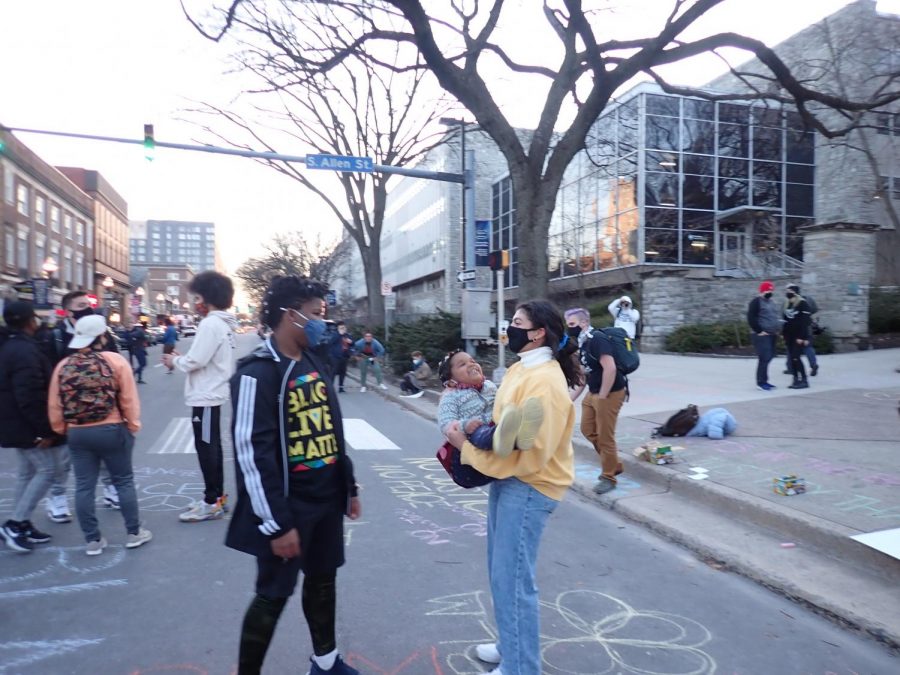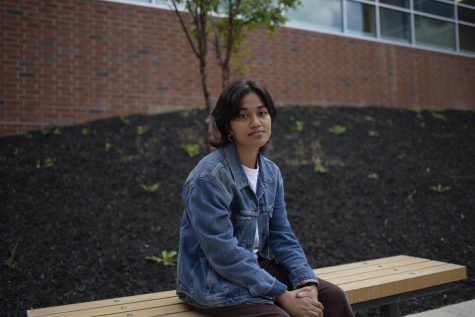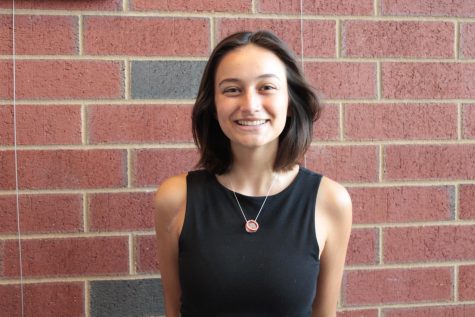The 3/20 Youth Coalition: An Introduction
State College, Pa, Mar. 20, 2021. 3/20 Youth Coalition co-leaders Sophia Galvin and Ire Mayegun at the Festival Honoring Osaze’s Legacy.
April 4, 2021
The 3/20 Coalition, a State College-based advocacy group, was created after the police murder of Osaze Osagie on Mar. 20, 2019, with the goal of getting justice for Osaze. An offshoot of the main branch, the 3/20 Youth Coalition, formed soon after in hopes of helping the main cause as well as developing an anti-racist environment within State College Area School District (SCASD) hallways.
The youth coalition, co-led by Delta senior Sophia Galvin and Delta junior Mayegun Ireolubowa, began after 3/20 Coalition members noticed the passion that local youth held for racial justice and activism.
“Over the summer at a meeting, Maggie Hernandez pulled me aside, and a few other students, and asked if we would be interested in forming a youth coalition, a branch for students to help get involved inside of 3/20 main group,” Galvin said. “I think that they were just like ‘these kids have something, they have a passion for it, they have the drive, the motive, there’s no reason they shouldn’t be allowed to do their thing.’”
The group formed and got straight to work through holding meetings, planning events, standing in solidarity with the main group, and offering their help in any way possible. Through the work they have done and continue to do, there are certain goals that members are keeping in mind.
“The main focus is police brutality, and as it’s a problem both nationally and as you’ve seen, in State College, in multiple different forms. It spawned originally off of the murder of Osaze Osagie, so I guess [our main focus] would be getting justice for his family,” Galvin said. “And just, kind of, try to create a more equitable and inclusive town. And safer. Significantly safer for people of color with the gradual abolition of our police, through both defunding and then eventually, just like I said, just not having the police considering we don’t need them.”
In seeking justice for Osaze Osagie, the coalition strives to rehumanize him and his story.
“A lot of people, after the Osaze murder, saw themselves in him. Whether as his kindness, his mental health, the position his family and friends were in; having a son, having a friend that struggled with mental health. It’s a position that no one should ever have to be in because mental health isn’t a police matter. It’s not something they’re trained on,” said Galvin.
While the youth coalition shares the main branch’s focus on police brutality and the Osaze case, there is an additional focus on inequities present in the school system.
“What we’re trying to focus on with SCAHS, is the disproportionate treatment of students of color, specifically Black students [and specifically those] with disabilities being suspended at a disproportionate and lethal rate. Being advocates for our peers in ways peer advocates aren’t able to be, and just raising awareness on social issues,” Galvin said.
With these focuses in mind, the youth coalition began planning their first event, a moderated panel that would be open for high schoolers to attend.
“We’re gonna be asking [panelists] questions about their activism, their story, how they got involved in activism, […] and we’re going to be asking them questions on their stances on certain social justice issues and topics, [like] how to be the most effective activist possible and advocates for others,” Galvin said. “A lot of [speakers] are local, from State College, either professors at Penn State, activists, friends of Osaze—we want to help educate the public as to what really happened—as well as just people from outside communities, such as Philadelphia, who started the Black Lives Matter in School Week and some speakers that we met during Bridging Divides.”
Looking to the future, the youth coalition has a number of things they aim to accomplish and work towards.
“We’re looking at holding more protests and community events in which we kind of educate the public on what different things mean, such as when we say ‘defund’ or ‘abolish the police,’ what really happened with Osaze Osagie, etc,” Galvin said. “We’re working on getting rid of School Resource Officers in our schools, especially considering that we’ve had alarming statistics about SCAHS.”
While there is significant support for the 3/20 Youth Coalition across the community, the group has still experienced pushback.
“We definitely have a lot of support from CCU, 3/20, even Diversity and Activism Club at State High,” Galvin said. “Outside of that, of course, there are always going to be people who aren’t happy with what we do. […] That’s how you know what we’re doing is important and needs to happen. ‘Cause some of the most uncomfortable conversations are often the most necessary.”
Galvin encourages community members to join the 3/20 Coalition, and had a message she wanted to communicate to them.
“Keep showing up and being there. […] It would mean a lot [for people to show up]. I know a lot of people post on social media, but don’t show up or donate or extend any further than that, and that shows, in your relationships with your friends. People who share those identities that you post about, but don’t show up for, feel that. That’s you not showing up for them. So, it’s really important for you to do more and do as much as you can if you actually care, if you actually want to be there for your friends,” said Galvin.
The 3/20 Youth Coalition members hope fellow classmates will see the importance of the coalition events and the worth of showing up.
“We hold events—they’re often. They’re free, so ya know, it’s easy to make excuses as to why you can’t show up, but we see through them and that’s you not showing up for us,” said Glavin. “If you could, ya know, keep showing up, keep fighting for those people that do thank you for all your support and your donations and everything — For trying to make a difference in our community, because it is making a difference.”
With the goals of justice and liberation of marginalized people in mind, the 3/20 Youth Coalition strives to make SCASD an equitable space for years to come. “We want to give everyone the same opportunity to be the best person they can be. And a lot of the time some students, because of their identities alone, face a significantly harder time and more challenging experience in schools, which isn’t fair. School should be a safe place where you’re not scared,” said Galvin in solidarity with marginalized students and the 3/20 Youth Coalition.



